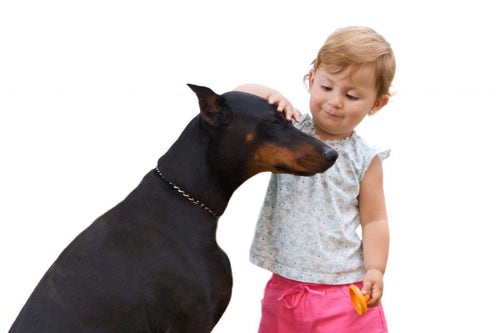Choosing a family dog is a big decision, and considering a Doberman might just surprise you. Known for their loyalty and intelligence, Dobermans have a lot to offer beyond their sleek and intimidating appearance.
These dogs are not only protective and trainable but also adaptable to various living environments. Understanding the temperament, exercise needs, and health considerations of Dobermans can help you decide if they are the perfect fit for your family.
Let’s Explore these eight surprising facts to see if a Doberman could be your next loyal family companion.
Are Dobermans Good Family Dogs?

The short answer is “Yes”. Dobermans can indeed be excellent family dogs, thanks to their blend of loyalty, intelligence, and protective nature. These dogs form strong bonds with their families and are known for being affectionate and gentle with children when properly trained and socialized.
Their natural protective instincts provide an added sense of security, making them vigilant guardians of the home. However, it’s important to ensure they receive ample exercise and mental stimulation, as their high energy levels and intelligence can lead to boredom and behavioral issues if not addressed.
Enrolling your Doberman in obedience classes and engaging in regular training sessions can help in maintaining their good behavior and strengthening the bond with your family. Overall, with the right approach and commitment, Dobermans can thrive as loving and reliable family companions.
What is the Temperament of a Doberman?
The temperament of a Doberman is a balanced mix of loyalty, intelligence, and assertiveness. These dogs are renowned for their strong bonds with their families, often displaying a deep sense of loyalty and protectiveness. There’s also another thing to consider while getting a Doberman, unlike Labradors retrievers or other friendly breeds, Dobermans usually tend to bond more closely with one member in family, so don’t be upset if you are not your Dobermans favorite hooman.
They are highly intelligent and trainable, making them responsive to consistent and positive training methods. This intelligence also means they need plenty of mental stimulation to stay happy and well-behaved. Dobermans are naturally alert and vigilant, traits that make them excellent watchdogs. However, their assertive nature means they need an owner who can provide firm and confident leadership.
Socializing a Doberman from a young age is crucial, as it helps them develop into well-rounded adults who can interact positively with people and other animals. Regular exercise is also essential to manage their high energy levels and prevent boredom. Overall, with the right training, socialization, and care, a Doberman can be a loving, loyal, and well-mannered companion.
Are Dobermans Good with Children?

Dobermans can be excellent companions for children when properly trained and socialized. Their loyal and protective nature often extends to all family members, making them attentive and caring towards kids.
To ensure a harmonious relationship, it’s important to introduce Dobermans to children early on and teach both the dog and the children how to interact safely and respectfully. Supervised play sessions can help the dog understand boundaries and foster a gentle demeanor.
Additionally, engaging the Doberman in regular exercise and mental stimulation can help mitigate any overly energetic behavior around children. While Dobermans are generally known for their patience and affection, individual temperament can vary, so observing interactions and reinforcing positive behavior is key. With the right guidance, Dobermans can be loving and reliable companions for families with children.
How Protective Are Dobermans Around Family Members?
Dobermans are renowned for their protective instincts towards family members, making them exceptional guard dogs. This breed is naturally vigilant and quick to sense any potential threats, which can provide a strong sense of security for the household. To harness and refine this protective nature, it is essential to invest in professional training that emphasizes obedience and controlled behavior.
Socialization is equally important, exposing the Doberman to various environments and people to ensure they can distinguish between genuine threats and normal interactions. Building a strong bond through regular, positive reinforcement training helps the dog understand its role within the family structure.
Despite their protective nature, Dobermans are also affectionate and loyal, often forming deep attachments to their owners. This combination of loyalty and protectiveness, when properly managed, makes Dobermans not only excellent protectors but also loving family companions.
Are Dobermans Easy to Train for Families?
Dobermans possess a combination of intelligence and eagerness to please that generally makes them receptive to training within a family setting. Their sharp minds and inherent loyalty to their owners contribute to their trainability, but it’s crucial to start early and be consistent with positive reinforcement techniques.
Establishing clear boundaries and routines helps Dobermans understand expectations and behaviors expected from them. Incorporating training into daily activities and making it a fun, engaging experience can foster a strong bond between the dog and family members. Patience and consistency are key; rewarding desired behaviors and redirecting unwanted ones effectively shapes their behavior.
While each Doberman’s temperament may vary, their ability to learn and adapt makes them generally suitable for families willing to invest time and effort into their training and socialization from an early age.
How Much Exercise Does a Doberman Need?
Dobermans are energetic and athletic dogs that require regular exercise to maintain their physical and mental well-being. As a breed known for their agility and strength, Dobermans benefit from daily exercise sessions that include brisk walks, jogging, or engaging in interactive playtime.
Ideally, they should have at least an hour of physical activity each day to burn off excess energy and prevent boredom. This exercise routine not only helps in keeping them physically fit but also stimulates their minds, which is crucial for their overall health.
Incorporating activities that challenge their agility and intelligence, such as obedience training, agility courses, or interactive toys, can further enhance their well-being and provide them with the mental stimulation they crave. Ensuring consistent exercise routines tailored to their individual needs helps Dobermans thrive as active members of their families.
Can Dobermans Adapt to Apartment Living?

Dobermans, known for their energetic nature and large size, can adapt to apartment living under certain conditions. While they are typically associated with larger homes and yards, Dobermans can thrive in apartments if their exercise needs are adequately met.
Regular walks, visits to dog parks, and interactive play sessions are essential to keep them physically and mentally stimulated despite limited indoor space. Providing them with mental enrichment through puzzle toys, obedience training, and socialization with other dogs can also help curb any potential boredom or restlessness.
Additionally, ensuring they have a comfortable and spacious area within the apartment for resting and sleeping is crucial. With proper training and attention to their needs, Dobermans can adjust well to apartment living and form strong bonds with their families in urban settings.
What are the Grooming Requirements for a Doberman?
Maintaining a Doberman’s grooming needs is essential to their overall health and appearance. Their short coat requires regular brushing to remove loose hair and distribute natural oils, which helps keep their coat shiny and healthy. Bathing should be done as needed, using a mild dog shampoo to avoid stripping the coat of its natural oils.
Pay attention to their ears, which can accumulate dirt and wax, leading to infections if not cleaned regularly with a veterinarian-approved ear cleaner. Additionally, trimming their nails every few weeks helps prevent overgrowth and discomfort, especially if they aren’t naturally worn down through exercise.
Lastly, dental hygiene is crucial; brushing their teeth several times a week and providing dental chews can reduce plaque and tartar buildup, promoting good oral health. By incorporating these grooming practices into their routine, you can ensure your Doberman stays clean, comfortable, and healthy.
Do Dobermans Have Any Common Health Issues to Watch For?

Dobermans, like any breed, are prone to certain health issues that owners should be aware of to ensure their well-being. One common concern is dilated cardiomyopathy (DCM), a heart condition that can affect Dobermans more than other breeds. Regular veterinary check-ups, including cardiac evaluations, can help detect and manage this condition early.
Another health issue is von Willebrand’s disease, a genetic bleeding disorder that affects the blood’s ability to clot properly. Testing can identify carriers, enabling responsible breeding practices. Hip dysplasia and hypothyroidism are also prevalent in Dobermans; monitoring their weight, providing joint supplements, and regular thyroid screenings can help manage these conditions effectively.
Lastly, Dobermans may be prone to bloat, a potentially life-threatening condition where the stomach twists, cutting off blood flow. Feeding them smaller meals throughout the day, avoiding exercise after meals, and using elevated feeding bowls can reduce the risk. Being proactive with regular vet visits and a healthy lifestyle can significantly contribute to a Doberman’s quality of life.
Summary
In conclusion, while Dobermans possess a reputation for their protective nature and loyalty, there are several factors to consider when contemplating them as family dogs. Their intelligence and trainability make them adaptable companions, suitable for families who invest time in proper socialization and training.
However, their energetic temperament necessitates regular exercise and mental stimulation. Potential health issues such as DCM and von Willebrand’s disease require proactive veterinary care. Dobermans thrive in homes with experienced owners who can provide consistent leadership and understand their breed-specific needs.
Ultimately, with the right environment and care, Dobermans can indeed be loving and devoted family members, bringing both protection and companionship to the household.
Recommended
8 Super-Foods to Ensure Your Doberman Lives a Long-Life
Do Doberman’s Make Good Guard Dogs – Are They Aggressive?
Doberman Pinscher Puppy Training and Socializing (A Complete Guide)
Doberman Pinscher Size and Weight – Everything a New Owner Needs to Know
Doberman Pinscher Temperament and Traits – Everything New Owner Should Know
The Doberman Pinscher: Complete Breed Guide

Vedant Narvekar is an experienced digital marketing expert with a profound love for nature and animals. With a career rooted in leveraging online platforms to drive engagement and promote meaningful causes, Vedant’s passion for animals inspired him to start Snout Story—a blog dedicated to educating people about pet keeping and sharing proper knowledge about caring for animals. Drawing on his expertise in digital marketing, Vedant utilizes his platform to advocate for responsible pet ownership, providing valuable insights on pet care, training, nutrition, and more. Through Snout Story, Vedant aims to empower pet lovers with the information they need to provide the best possible care for their furry companions, while also fostering a deeper appreciation for the natural world and the creatures that inhabit it.







